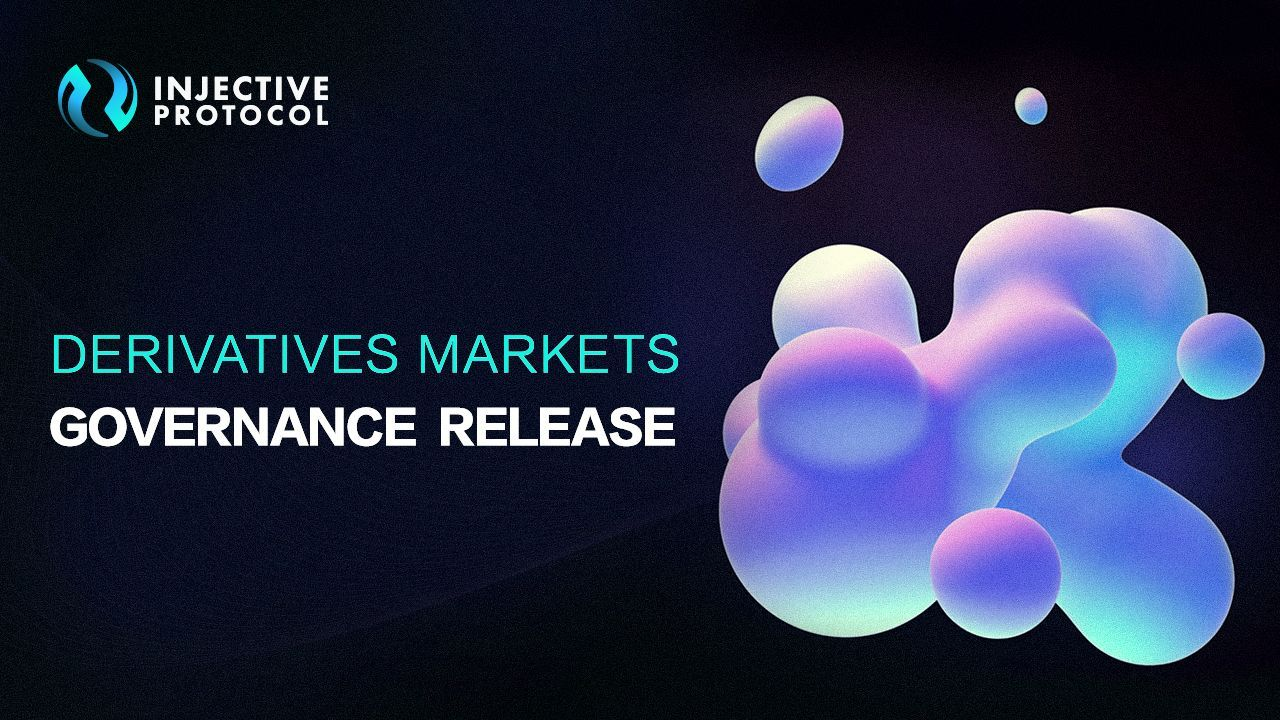Original link:https://blog.injectiveprotocol.com/derivatives-governance-launch/

Original link:
We are excited to launch governance functionality for the Injective derivatives market! Starting today, users participating in Equinox staking will be able to post new derivatives market proposals for both perpetual and delivery contracts.
The governance process is a core component of the decentralized protocol, and it will play an important role in our upcoming mainnet release. Plus, publishing governance proposals will get you even more APY boosts on Equinox staking!
secondary titlehttps://staking.injective.network/
background
background
Early last month, we went live with the spot market governance process, which enables Equinox users to launch new spot markets on Injective.
https://weibo.com/ttarticle/p/show?id=2309404638962093523228
Before launching the derivatives market proposal, it is necessary to establish an insurance fund to protect traders when trading with leverage. That's why we released the Injective Insurance Fund this week, and you can find out more at the link below.
Especially when trading in derivatives markets, insurance funds are crucial to help protect traders on the platform.
secondary title
Derivatives Market Governance
The governance process for derivatives operates in a similar manner to the spot proposal.
The main difference is that users can now choose which oracle provider they wish to use. Over the past few months, Injective data service has become very powerful, we have entered into cooperation with famous projects such as Coinbase, Chainlink, Band Protocol, UMA and so on. Having multiple oracle providers demonstrates the highly decentralized nature of Injective, while also giving our users more choice in creating new markets. In the future, we will also add more oracle price feeds.
secondary title
https://blog.injectiveprotocol.com/futures-and-perpetual-swap-contracts/
common problem
common problem
What is on-chain governance?
The Injective chain is not only a blockchain based on the PoS mechanism, but also introduces on-chain governance. In order for the Injective Chain to be continuously upgraded and improved over time, community members can coordinate both on-chain (formal) and off-chain (informal) to participate in discussions and debates about the trade-offs of specific feature changes.
What is a Derivatives Proposal?
Through proposals, the community can propose changes to on-chain parameters, such as launching new markets, updating markets, software updates, and more. Proposals have 4 different states: Deposited, Voted, Approved, Rejected.
Why should I participate in derivatives governance?
The governance process allows you to reach new markets on Injective and earn 3% APY growth. Earn an additional 5% APY boost if your proposal is voted on!
What kind of votes can I cast on a proposal?
There are 4 options. For, against, abstention, veto. A veto is considered a disapproval, but at the same time the veto is added. Abstaining from voting allows voters to indicate that they have no intention of voting for or against the proposal, but are willing to accept the outcome of the vote.
What is the retention period for proposals?
In order to prevent useless proposals, INJ needs to be submitted as a deposit when making proposals. The proposal cannot enter the voting state until the security deposit is greater than or equal to the minimum security deposit (ie 1,000 INJ).
If you do not have enough INJ as a deposit, you can invite other community members to help push the proposal to the "voting" state.
What happens to the security deposit used for the proposal?
After the proposal is finalized (passed or rejected), the security deposit will be refunded or destroyed according to the final statistics of the proposal. If the proposal is approved, or objected but not rejected, the security deposit will be automatically returned to the respective depositor. If the proposal is rejected by a majority, then the security deposit will be destroyed.
What is the quorum for the proposal to pass?
Quorum is defined as the minimum percentage of votes that need to be cast on a proposal for a result to be valid.
What is the threshold for the proposal to pass?
Threshold (Threshold) is defined as the lowest proportion of all votes (excluding abstentions) that make the proposal pass.
Initially, the threshold is set at 50%, but if more than 1/3 of the votes (excluding abstentions) are vetoes, it can be vetoed. This means that if at the end of the voting period the proportion of "yes" votes (excluding abstentions) is greater than 50%, and the proportion of "no" votes is less than 1/3 (without abstentions), the proposal passes.
What are the key terms to know when launching a new marketplace?
When interacting with governance processes, you will come across a lot of terminology. Some key terms are:
Quote Denom: The token used to mark the price. For example, in the INJ/USDT market, USDT is the denominated token because the INJ price is calculated using the USDT price.
Oracle Type: the type of oracle used, such as Coinbase, Band or PriceFeeder (Binance);
Oracle Quote: an oracle used to provide quote token prices;
Oracle Base: an oracle used to provide benchmark token prices;
Initial Margin Ratio (initial margin ratio): the minimum margin ratio when opening a position, such as 0.05, will result in a nominal margin requirement of 5% (maximum 20 times leverage);
Maintenance Margin Ratio: the minimum margin that must be held in order to prevent liquidation;
Expiry (delivery time): The delivery time of the delivery contract market.